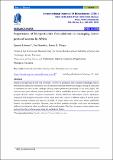| dc.description.abstract | Sesame is an important oil seed crop worldwide. However, its production faces a number of challenges such as infestation by insect pests and diseases, use of unimproved seeds by farmers and drought. Among all, insect pest is considered the most serious challenge affecting sesame production particularly in the Africa region. The common insect pests affecting sesame production in African smallholder farmers are Myzus persicae, Aphis gossypii, Bemisia tabaci, Antigastra catalaunalis, Orosius albicinctus, Tetranychus urticae, Spodoptera frugiperda and Alocypha bimaculata. These insect pests infest sesame at different stages of growth posing immense damage resulting into huge loss of yields. To control these insect pests most African smallholder farmers, use synthetic pesticides. However, most of those synthetic pesticides used cause environmental pollution and detriment effects to pollinators and natural enemies. Therefore, this paper reviews sesame insect pests and how they can be managed using bio-pesticides in African.. | en_US |

